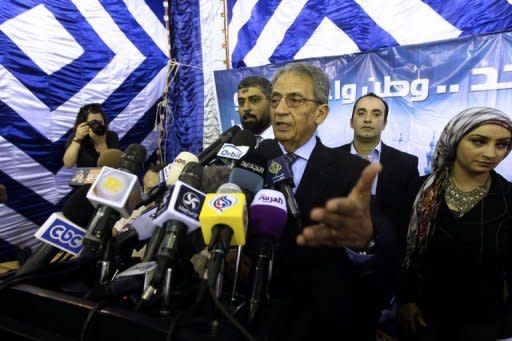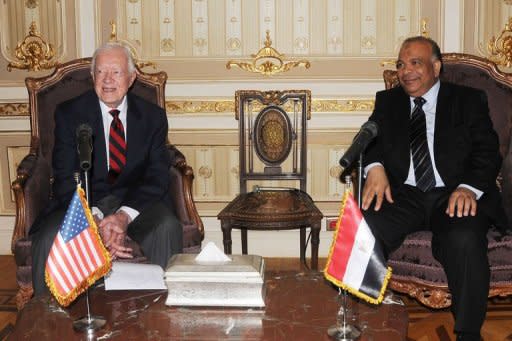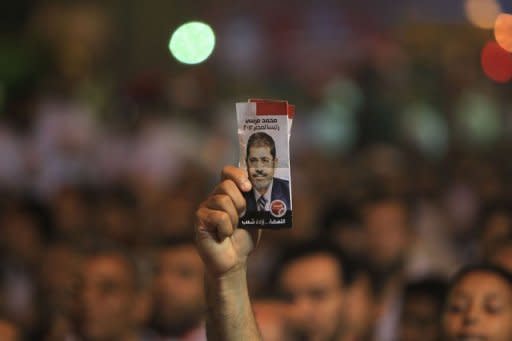Military urges Egyptians to accept looming vote
The Supreme Council of the Armed Forces on Monday urged Egyptians to accept the results of a looming presidential election, the first in the country since a 2011 uprising ousted dictator Hosni Mubarak. In a statement posted on its Facebook page, the SCAF stressed "the importance of accepting the results of the election which will reflect the choice of the free Egyptian people." Around 50 million eligible voters are being called to choose Mubarak's successor on Wednesday and Thursday, with a run-off scheduled next month should there be no outright winner. Campaigning for the landmark poll ended on Sunday night, wrapping up an unprecedented exercise in democracy made possible by the 2011 revolt. According to the electoral rules laid down by the Supreme Presidential Election Commission, the dozen candidates cannot give any media interviews or make public appearances until polls close. The main contenders are former foreign minister and Arab League chief Amr Mussa; Ahmed Shafiq, the last premier to serve under Mubarak; the Muslim Brotherhood's Mohammed Mursi and independent Islamist Abdel Moneim Abul Fotouh. The SCAF is touting the poll as evidence that "the democratic process is taking its first step, we must all participate." The council, led by Mubarak's longtime defence minister Field Marshal Hussein Tantawi, said it was of "utmost importance" that Egyptians vote in the poll "on which hopes are pinned that the country (will move) towards progress, prosperity and stability." Parliamentary speaker Saad al-Katatni declared that "Egypt is witnessing an unprecedented experience," in a meeting with former US president Jimmy Carter in Cairo, the official MENA news agency reported. Carter had arrived on Sunday with a delegation from his Carter Center to monitor the polls. "The Egyptian people will accept the results of the election whatever they may be as long as the (polls) are fair and express the will of people," said Katatni. Initial results of expatriate voting showed Muslim Brotherhood candidate Mursi leading the race thanks to massive support from the Egyptian community in Saudi Arabia. Egyptians abroad went to the polls ahead of their compatriots at home, with embassies and consulates gradually releasing results. A tally announced by Egyptian missions in 33 countries put Mursi far ahead, with 106,252 votes, with Abul Fotouh following with 77,499. Pan-Arab Nasserist Hamdeen Sabbahi came third with 44,727 votes, while Mussa was in fourth place, followed by Shafiq. Hopefuls have been criss-crossing the country for weeks, promising a brighter future to a population led by a string of autocratic rulers for decades. Interior Minister Mohammed Ibrahim said security forces would be deployed at polling stations around the country, particularly at the 351 centres where ballot papers will be taken for the count. The election has pitted Islamists against secularists, and revolutionaries against members of the former regime, and for the first time in the country's history, the outcome is unknown. Just moments before the deadline for the "campaign silence," the powerful Muslim Brotherhood's candidate Mursi warned Sunday against any attempt to tamper with the presidential poll, at a rally attended by thousands of supporters. Mussa held a final press conference saying support was increasing for his campaign, days after Abul Fotouh held a festive final rally in Cairo promising to unite Egyptians. Sketchy opinion polls taken by a government-funded think-tank and the cabinet's research division show Mursi trailing behind Abul Fotouh, Mussa and Shafiq. The SCAF has pledged a fair election and has promised to hand power to civilian rule once a new leader is elected. The power transfer will seal the end of a turbulent transition period marked by violent and sometimes deadly protests and a deteriorating economy.




